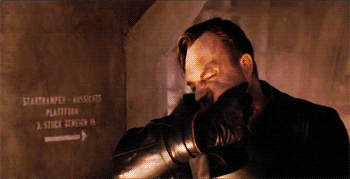Red Skull - the villain of Captain America: the First Avenger
Mogambo - the villain of Mr. India
("Khush-Hua" means "is pleased" roughly)
Two similar movies, each with a focus on a main superhero who represents their country in ideals as well as name, fighting a villain who embodies the epitome of all they are against.
Captain America. A hero of red, white and blue.
Mr. India. A hero of . . . dark grey and . . . a beige hat?
Each hero has one thing (apart from their morals and ideals) that enables them to fight evil and be a hero in the first place.
Cap has his super-serum, allowing him to ♫ run faster, jump higher. ♫
Mr. India has an invisibility bracelet, allowing him to turn invisible.
They are both good men, with high ideals and moral standards, fighting bad men with none. Mogambo aims to destroy and control all of India, and Red Skull seeks the same, just with a larger target in mind: the whole world.
Each character has a close connection to youth. Captain America was a young, weasel-y kid facing discrimination and bullying from others. Part of why he was bullied was because of his removal of local youth culture - the whole immoral, playboy nature of teens his age din't appeal to him - he had higher ideals.
Mr. India is a kind man, who runs an impromptu (likely un-certified and illegal) orphanage for starving kids from the street. He takes any work he can to make up enough money to buy food for the kids, and he loves them deeply.
Each character also is forced to deal with war. Captain America less so, because he did want to fight in the war. But nevertheless, he was chosen for the Supersoldier program, and thrust into World War II, fighting the Nazi War Machine, fighting fro freedom, and justice and liberty.
Mr. India fights against Mogambo. Originally, all he wants is to feed the kids, but soon he is forced to fight the forces of terror commanded by Mogambo. Mogambo places bombs, and attempts to nuke India, and save for one bomb, Mr. India thwarts it all.
Each movie is an origin story showing how one kind man becomes a hero and saves the world. Each hero fights a vicious, merciless villain commanding armies of minions, hoping for destruction and domination. Each time, the hero wins after a battle where the hero must sacrifice something.
Each character represents the highest, most praised ideals. Kindness, charity, selflessness, honesty and family. Superheroes are staples of cultures. I would be surprised to hear of a culture that doesn't have some form of hero. And a good, proper hero, from any culture, is likely to have the same ideals as another, no matter the time or location. Humans, in the end, will always hold in high esteem these certain ideals.






